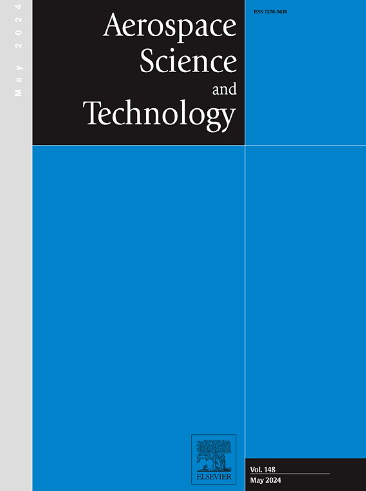Numerical investigation on the blade vortex interaction noise reduction using higher harmonic control
IF 5
1区 工程技术
Q1 ENGINEERING, AEROSPACE
引用次数: 0
Abstract
Accurately predicting the formation, evolution, and breakdown of helicopter blade tip vortex is crucial for simulating the Blade-Vortex Interaction (BVI) phenomenon. Firstly, the high-order Perturbed polynomial reconstructed Targeted Essentially Non-Oscillatory (TENO-P) scheme proposed by our research group is employed to improve the resolution of the helicopter rotor flowfield solver. The TENO-P scheme, building on the fifth-order TENO5 scheme, achieves one-order of accuracy improvement by adaptively adjusting the values of the free-parameter introduced by perturbed polynomial reconstruction. Subsequently, the AH-1 helicopter model rotor undergoing blade-vortex interaction is analyzed using the improved rotor flowfield solver and the Farassat-1A formula. The implementation of the TENO-P scheme notably enhances the resolution of the rotor flowfield solver in resolving the blade tip vortex structures, and the predicted noise results are in good agreement with the experimental data. Finally, the alteration of the BVI noise and its reduction mechanism of the AH-1 model rotor under different Higher Harmonic Controls (HHC) are analyzed. The findings show that the phase modulation margin increases with a decrease in harmonic order, and the noise reduction effect significantly improves as well. The negative component of the higher harmonic control is beneficial for reducing BVI noise while the positive component of the higher harmonic control exacerbates the BVI noise. The HHC reduces the collective pitch angle in the region where the tip vortex is about to be disturbed, decreasing the strength of the blade tip vortex in this region. This reduction weakens the strength of the parallel and near-parallel interaction on the advancing side, leads to the reduction of the positive peak impulsive of the BVI noise, and consequently lowers the intensity of the BVI noise.
利用高次谐波控制降低叶片涡流相互作用噪音的数值研究
准确预测直升机桨叶尖端涡旋的形成、演变和崩溃对于模拟桨叶-涡旋相互作用(BVI)现象至关重要。首先,我们的研究小组提出了高阶扰动多项式重构的目标基本非振荡(TENO-P)方案,以提高直升机旋翼流场求解器的分辨率。TENO-P 方案以五阶 TENO5 方案为基础,通过自适应调整扰动多项式重构引入的自由参数值,实现了一阶精度的提高。随后,使用改进的旋翼流场求解器和 Farassat-1A 公式分析了发生叶片-涡流相互作用的 AH-1 直升机模型旋翼。TENO-P 方案的实施显著提高了转子流场求解器对叶尖涡流结构的解析能力,预测的噪声结果与实验数据十分吻合。最后,分析了 AH-1 模型转子在不同高次谐波控制(HHC)下的 BVI 噪声变化及其降低机制。研究结果表明,相位调制裕度随着谐波阶数的降低而增加,降噪效果也显著提高。高次谐波控制的负分量有利于降低 BVI 噪声,而高次谐波控制的正分量则会加剧 BVI 噪声。在叶尖涡旋即将受到扰动的区域,高次谐波控制减小了集合俯仰角,从而降低了该区域的叶尖涡旋强度。这种减小削弱了前进侧平行和近平行相互作用的强度,导致 BVI 噪声的正峰值脉冲减小,从而降低了 BVI 噪声的强度。
本文章由计算机程序翻译,如有差异,请以英文原文为准。
求助全文
约1分钟内获得全文
求助全文
来源期刊

Aerospace Science and Technology
工程技术-工程:宇航
CiteScore
10.30
自引率
28.60%
发文量
654
审稿时长
54 days
期刊介绍:
Aerospace Science and Technology publishes articles of outstanding scientific quality. Each article is reviewed by two referees. The journal welcomes papers from a wide range of countries. This journal publishes original papers, review articles and short communications related to all fields of aerospace research, fundamental and applied, potential applications of which are clearly related to:
• The design and the manufacture of aircraft, helicopters, missiles, launchers and satellites
• The control of their environment
• The study of various systems they are involved in, as supports or as targets.
Authors are invited to submit papers on new advances in the following topics to aerospace applications:
• Fluid dynamics
• Energetics and propulsion
• Materials and structures
• Flight mechanics
• Navigation, guidance and control
• Acoustics
• Optics
• Electromagnetism and radar
• Signal and image processing
• Information processing
• Data fusion
• Decision aid
• Human behaviour
• Robotics and intelligent systems
• Complex system engineering.
Etc.
 求助内容:
求助内容: 应助结果提醒方式:
应助结果提醒方式:


